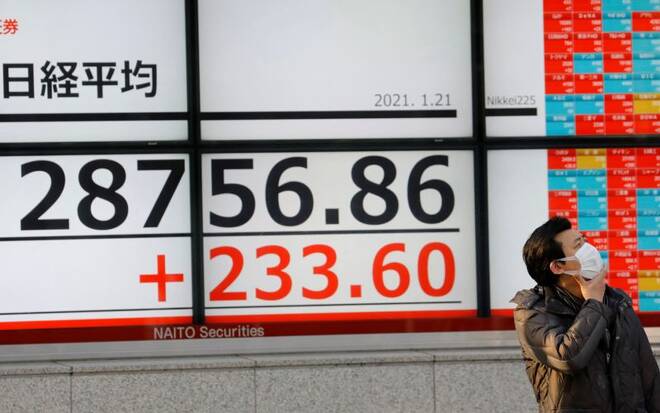Advertisement
Advertisement
Bond yields tumble as Netflix fuels stock market sell-off
By:
By Kanupriya Kapoor and Stella Qiu SINGAPORE (Reuters) - Asian share markets and U.S. futures fell on Friday, after U.S. stocks took a knock overnight, hurt by lingering concerns over the Federal Reserve's tightening and weaker-than-expected economic and earnings data.
By Herbert Lash and Tommy Wilkes
NEW YORK/LONDON (Reuters) -Risk aversion dominated markets on Friday as stocks slumped on Wall Street and in Europe, oil prices fell from seven-year highs earlier in the week and bond prices surged with traders scurrying for the relative safety of government debt.
Poor subscriber growth reported late Thursday at Netflix Inc sent its shares plunging 21.8% and cast a pall over a market already shaken by concerns the Federal Reserve will tighten monetary policy too aggressively to fight inflation.
Investors are waiting for details from the Fed’s policy meeting next week on how it will proceed at a time that inflation is such a hot political issue it could force a more hawkish stance.
Data, however, won’t begin to show an expected slower pace of rising consumer prices for at least a few months, making Fed Chair Jerome Powell’s job more difficult as he tries to calm markets.
“We know the Fed is beginning to pivot and the problem is that the inflation numbers are not going to start to trend lower until later this spring,” said Andrew Slimmon, a managing director at Morgan Stanley Investment Management.
Despite the negative Netflix earnings, it’s too early to know whether corporate fundamentals won’t continue to be strong, he said.
In Europe, the German, French and Italian indices fell almost 2%, with the broad Euro STOXX index of 600 leading regional companies closing down 1.84%. MSCI’s all-country world index fell 1.74%.
On Wall Street, the Dow Jones Industrial Average slid 1.30%, the S&P 500 fell 1.89% and the Nasdaq Composite lost 2.72%. Both the S&P 500 and the Nasdaq posted their biggest weekly declines since the market crashed in March 2020.
With the Fed posed to hike interest rates as many as four times this year, fear of a hard landing has risen among investors. But a slowing economy in the months ahead will probably give the Fed second thoughts, said Steven Ricchiuto, U.S. chief economist at Mizuho Securities USA LLC.
“By the time we get to the second rate hike, everything will be rolling over enough that everybody will back off from these calls,” he said. “The growth numbers will be slowing much more quickly than the Fed anticipated.”
U.S. Treasury and euro zone government bond yields fell as concerns about potential conflict in Ukraine also dented risk appetite and stock market drops increased demand for the debt.
The yield on 10-year Treasury notes fell 7.2 basis points to 1.762%, a sharp drop from a two-year high of 1.902% touched on Wednesday.
Markets overnight in Asia were broadly lower, including in China where benchmark mortgage rates were cut on Thursday in the latest move to prop up an economy soured by its property sector.
The U.S. dollar edged lower with U.S. Treasury yields, with investors looking to next week’s Fed meeting for more clarity on the outlook for rate hikes and quantitative tightening.
The dollar index, which tracks the greenback versus a basket of six currencies, fell 0.138% to 95.627. The yen was last down 0.40% at $113.6300. The euro was last up 0.30 percent at $1.1344,
Oil prices slid for a second day, pressured by an unexpected rise in U.S. crude and fuel inventories while investors took profits after global oil benchmarks touched seven-year highs.
Brent crude futures fell 49 cents, or 0.6%, to settle at $87.89 a barrel, while U.S. futures settled down 41 cents at $85.14 a barrel.
Gold was set to gain for a second week as inflation and geopolitical risks lifted its safe-haven appeal, but it slipped on Friday amid a broader decline in commodities.
U.S. gold futures settled down 0.6% at $1,831.80 an ounce.
(Reporting by Herbert Lash, dditional reporting by Sujata Rao in London and Kanupriya Kapoor and Stella Qiu in Singapore; Editing by Raissa Kasolowsky, Kirsten Donovan, Alexander Smith and Jonathan Oatis)
About the Author
Reuterscontributor
Reuters, the news and media division of Thomson Reuters, is the world’s largest international multimedia news provider reaching more than one billion people every day. Reuters provides trusted business, financial, national, and international news to professionals via Thomson Reuters desktops, the world's media organizations, and directly to consumers at Reuters.com and via Reuters TV. Learn more about Thomson Reuters products:
Advertisement
